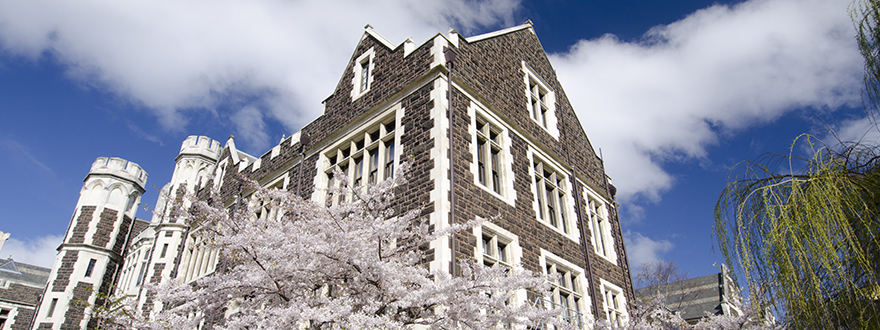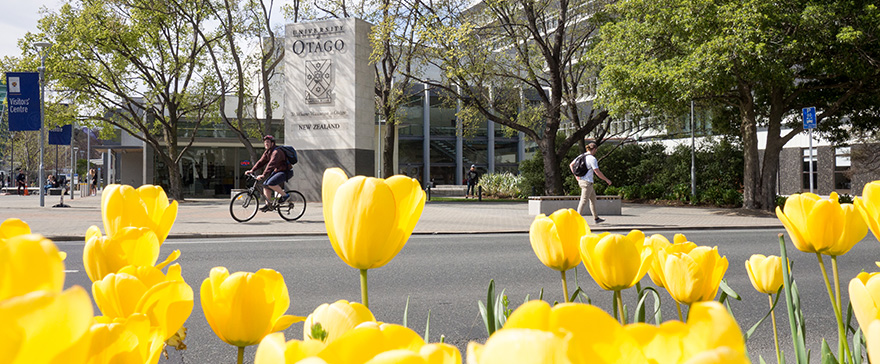Bequests are an opportunity for anyone to make a significant contribution to the University without affecting their assets during their lifetime. Every bequest is a legacy gift – a gift which makes a unique, personal, and enduring contribution to the University.
It is a gift that passes forward to the next generation, ensuring that future generations have the resources and opportunities that they need to be successful and to make a difference.
From its earliest days, the University of Otago has benefitted from such legacy gifts. With the generous help of alumni and friends who have left a provision in their wills, the University of Otago has been able to advance high quality education and attain world renown for both its teaching and research. Here are some examples of bequests received.
By making a bequest in your will to the University of Otago Foundation Trust you would be enabling your wishes for a charitable gift after your death, knowing that it would continue to grow and be cherished through the lives of others. You can designate where your bequest is to be used. For example, you could provide resources to strengthen existing programmes and research, award scholarships to deserving students, or respond to new ideas or areas of need.

Types of bequests
-
Specific Bequest
Donates a specific dollar amount or a specific asset such as property, stocks/shares, works of art etc.
-
Percentage Bequest
Donates a certain percentage of your estate.
-
Residuary Bequest
Donates the balance of your estate after all your debts, taxes, expenses and other beneficiaries have been paid.
-
Contingent Bequest
Makes a gift if specific conditions are met (e.g. a spouse dies before the donor).
Sample bequest language
Your will writer needs to know that bequests to the University of Otago should be made to the University of Otago Foundation Trust (a registered charity – Number CC20440). The University has established this special Foundation to receive and administer bequests and donations. We recommend you consult a legal advisor when making provision for a gift in a new will, or adding a codicil to an existing will. Sample wording for a will and for a codicil for you and your legal advisor to use are available on request.
The best way to make sure that your gift goes to where you want is to discuss your wishes with the University representative who is familiar with options that exist at the University of Otago, and understands how your legacy gift can be documented to reflect what is important to you. The person to talk with is:
Murray Lopdell-Lawrence |
POST: |

Questions to consider
Will the bequest be for general purpose or restricted?
Unrestricted bequests can be used when opportunities or unforeseen needs arise – the University can use it where it identifies a need, both immediate and for the future.
Restricted or designated gifts are made with a particular programme or purpose in mind. They can only be used according to your wishes. You may want to specify support for a particular need you identify with; an outcome that is meaningful to you or to people close to you; or a particular academic discipline at the University. Examples of this type include establishing a scholarship, supporting research or helping to meet a specific need within a programme or area of study.
Will the bequest be an endowed or current-use fund?
Both unrestricted and restricted gifts can be endowed or current-use funds. Current-use gifts are not permanent and the principal can be used all at once or over time. Whereas a gift for an endowment, also known as a permanent fund, is a gift invested with the intention of using only the income generated from the investment while the fund retains its original capital value. These endowed gifts have minimum gift levels and are usually designed to make annual distributions from the invested capital to support specific objectives.
Also, you may wish to personalise these designated endowment gifts by naming them. There are specific guidelines for endowed gifts. If this is of interest, please contact the Manager of Bequests Murray E. Lopdell-Lawrence (see above).
Steps to leaving a bequest to the University of Otago
- Determine how your estate should be distributed, in consultation with a lawyer or legal advisor experienced in preparing wills, trusts and other forms of estate planning documents.
- Provide the Manager of Bequests in the Development and Alumni Relations Office at the University with a copy of the provisions of your executed documents that will benefit the University of Otago or complete a confirmation of planned gift form.
- Receive appropriate acknowledgement and recognition for your intended gift, if desired.
- We will of course respect your wishes should you prefer to remain anonymous.
Benefits of a bequest
You can make a lasting impact at the University of Otago. Many gifts of this type provide valuable support to programmes, students, and faculty. This ongoing impact is vital as the University pursues worldwide recognition for its research, teaching, and service.
If you have already included the University of Otago in your estate plans, please contact our office to discuss your gift. We would like the opportunity to thank you and ensure your gift is fulfilled according to your wishes.
Become a distinguished member of the Legacy Society:
If you notify the University of your bequest, you will be included as a member in the Legacy Society.
The Legacy Society recognises everyone who has named the University as a beneficiary of a planned gift or bequest. The Society offers opportunities for members to meet others who have made similar provision for the University in their will, to keep in touch with what is happening at the University, and to set a philanthropic example that others may choose to follow.
- Invitations to University and Foundation events, including a special function held annually for members.
- The awarding of a special Legacy Society lapel pin.
- Acknowledgment on the University website and in the Foundation's Annual Report.
- Regular news from the University and the Foundation via your preferred communication channel.
